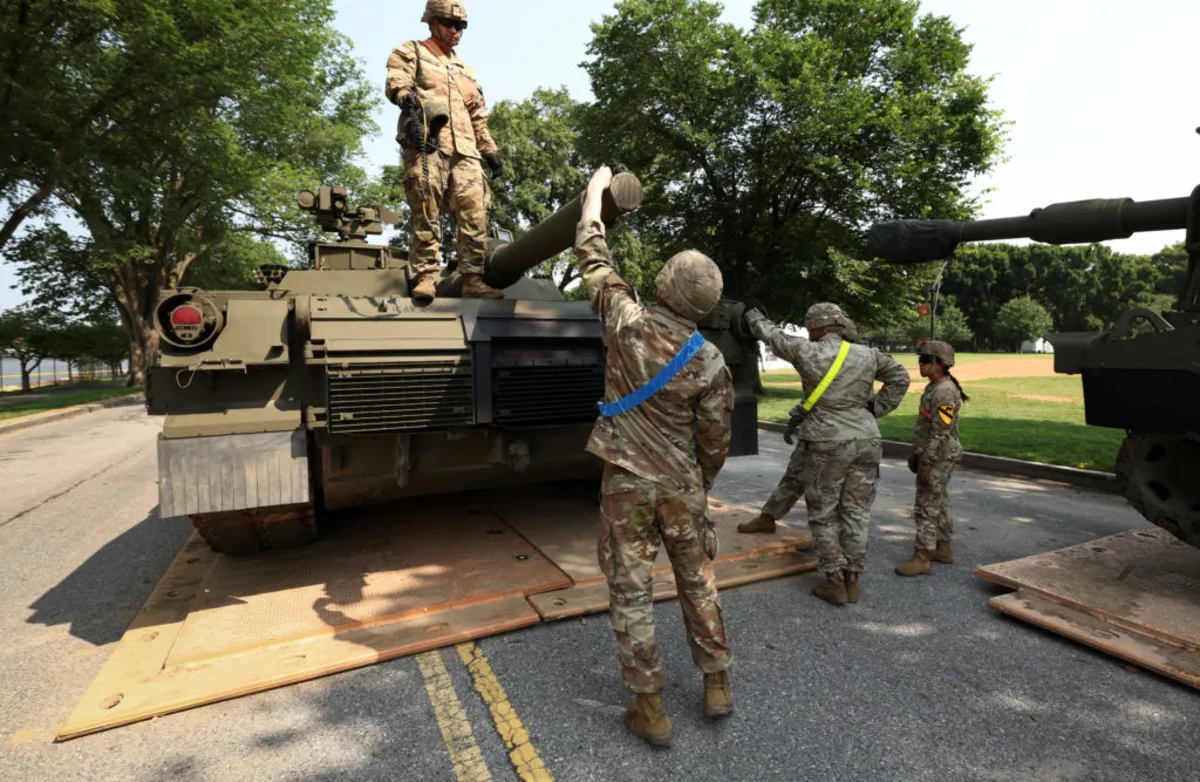
As Washington gears up for a significant military parade this weekend to commemorate the 250th anniversary of the U.S. Army, a recent survey indicates that a majority of U.S. adults tend to approve of President Donald Trump’s decision to host the event. However, the poll, conducted by The Associated Press-NORC Center for Public Affairs Research, shows that around 60% of Americans believe that Saturday’s parade is “not a good use” of taxpayer money. This sentiment is particularly strong among those who neither approve nor disapprove of the celebration, making up 78% of respondents.
The survey highlights that approximately 40% of U.S. adults "somewhat" or "strongly" approve of the parade, while about 30% express disapproval. Interestingly, another 30% fall into the neutral category, indicating a lack of strong opinions on the matter. Carol Sue Quillen, a 69-year-old retiree from Live Oak, Florida, views the parade as an essential tribute to the nation’s service members, including her late father, an Air Force test pilot, and her son-in-law, who serves in the special forces. “I don’t necessarily think we appreciate our military as much as we should,” Quillen stated, reflecting her support for the event despite acknowledging the overwhelming personality of Trump.
From a political standpoint, the survey reveals a stark divide in opinion. Most Republicans—approximately two-thirds—support the parade and view it as a justified expense. Conversely, Democrats overwhelmingly believe the event is not a sound use of public funds. Independents also display a tendency to be skeptical, with about half neither approving nor disapproving of the parade, suggesting they might be less informed or engaged with the event.
Matt Wheeler, a 40-year-old nonprofit fundraiser from Los Angeles, criticized the parade as “extremely wasteful” and “a bit of a performance,” drawing comparisons to militaristic displays seen in historical regimes. His comments reflect a broader concern among some Americans about the implications of showcasing military might in such a public forum.
Sam Walters, a 45-year-old restaurant worker from Fort Worth, Texas, expressed apprehension about the additional funding allocated for the parade, given the already substantial defense budget. “When they’re getting hundreds of billions a year for funding, more than for anything else, it seems kind of hard to justify them spending extra for that,” he remarked. This concern resonates with the general sentiment across the nation, where opinions are divided on military spending. Approximately 30% of respondents feel that the government is spending “too much” on the military, while an equal share believes it is “too little.” About 40% maintain that the spending is “about the right amount.”
In terms of President Trump's overall approval ratings, around 40% of Americans approve of his job performance, a figure that remains consistent with previous polls. The survey was conducted from June 5-9, a period that included significant protests in Los Angeles related to Trump's immigration policies, although the poll did not address these events directly. Notably, Trump's handling of immigration received a 46% approval rating, which stands higher than his ratings for economic management or trade negotiations, both of which are at 38%.
Andrew Thomsen, a 31-year-old educator from Oklahoma City, expressed a nuanced perspective. While he generally approves of Trump’s direction, he is not in favor of parades that showcase military strength. “If it is a march of rows and rows of members from our different branches while showboating our tanks, missile systems, and other equipment to show how strong we are, then I don’t support that,” he stated, echoing concerns that many Americans share.
The AP-NORC poll surveyed 1,158 adults, utilizing a representative sample from NORC’s AmeriSpeak Panel, with a margin of error of plus or minus 4 percentage points. As the parade approaches, it remains to be seen how public opinion may evolve in response to the festivities and their broader implications for American values and military representation.